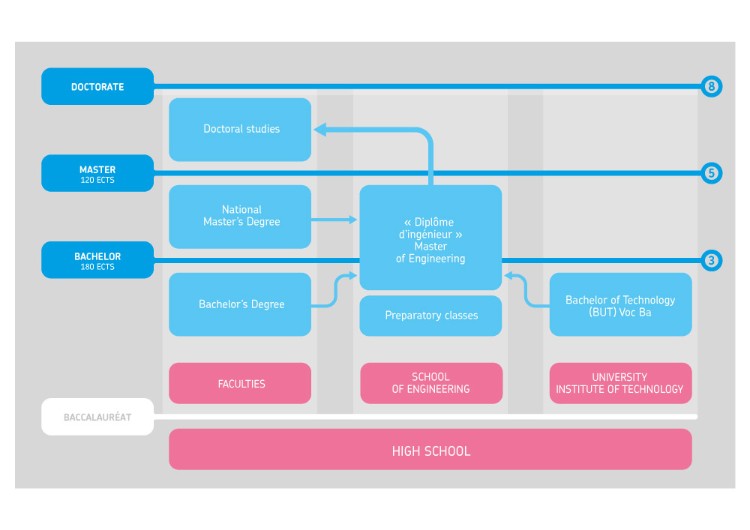Understanding the French Higher Education System
Understanding the French Higher Education System
The LMD system: Bachelor (Licence in French), Master, Doctorate
France, like other European countries, confers national degrees such as a Bachelor in 3 years, a Master in 5 years and a Doctorate in 8 years. UBS helps students prepare to 60 classical vocational Bachelors, 28 different types of Masters, four engineers’ degrees all in all in 154 domains. UBS also hosts approximately 150 PhD doctorates each year.
Diagram
The European Credit Transfer System and Accumulation System (ECTS)
This European Credit Transfer System (ECTS) was established in 1989 to facilitate the ERASMUS + mobility program and the accreditation and transfer of credits earned in different higher education institutions abroad.
ECTS is a central tool, supporting what is commonly referred to as the Bologna process, which is a series of ongoing high-level ministerial meetings between 48 countries to harmonise the European Higher Education architecture.
Practical outcomes of these meetings include the creation in 2010 of a common European Higher Education Area (EHEA).
The European Credit Transfer Systems was put in place to ensure seamless student mobility schemes with explicit, transparent and comparable learning outcomes.
The Bologna process reinforces this mobility by ensuring common principles such as student-centred teaching, the integration of lifelong learning, transparency around learning outcomes and flexibility.
ECTS is therefore a Quality Assurance system applied to support student mobility between higher education institutions.
Course catalogues, Learning Agreements and Transcripts of Records help the recognition and transfer of credits earned by students during a mobility period abroad. The ECTS Users' Guide describes the system and how it is used in greater detail.
- One semester awards 30 European Credit Transfer Systems (ECTS). This means the successful validation of one semester is worth 30 credits points
- The workload estimated for 1 ECTS is approximately 25 to 30 hours of work
- Students accumulate these credits each year if they pass all their examinations. They hence accumulate 60 credits at the end of year 1 of a Bachelor, 120 ECTS at the end of year 2 and 180 ECTS at the end of year 3 of a Bachelor. The same applies to Masters (5 years) and Doctorates (8 years) as you can see in the diagram above
- ECTS credits are recognised by many countries in Europe and around the world, so students can undertake exchange programs and have their semesters abroad seamlessly validated that way.
For further information refer to EACEA




